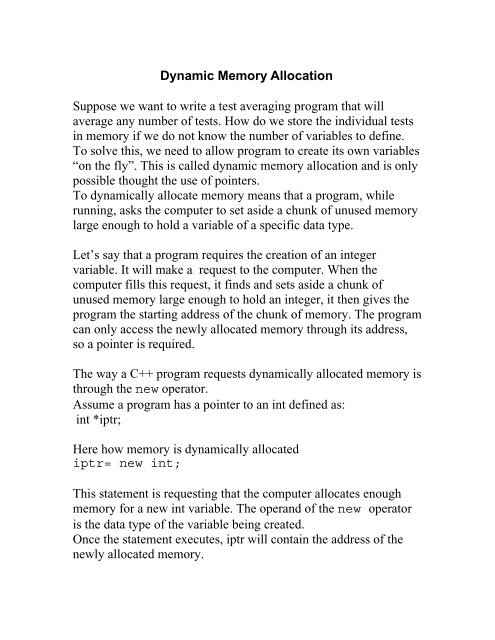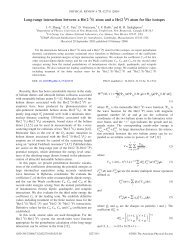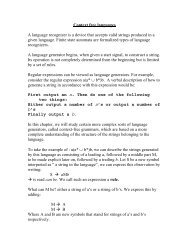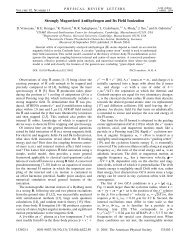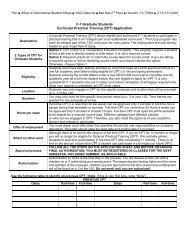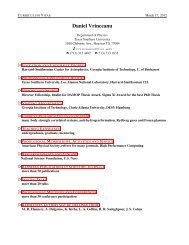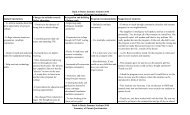Dynamic Memory Allocation Suppose we want to write a test ...
Dynamic Memory Allocation Suppose we want to write a test ...
Dynamic Memory Allocation Suppose we want to write a test ...
You also want an ePaper? Increase the reach of your titles
YUMPU automatically turns print PDFs into web optimized ePapers that Google loves.
<strong>Dynamic</strong> <strong>Memory</strong> <strong>Allocation</strong><br />
<strong>Suppose</strong> <strong>we</strong> <strong>want</strong> <strong>to</strong> <strong>write</strong> a <strong>test</strong> averaging program that will<br />
average any number of <strong>test</strong>s. How do <strong>we</strong> s<strong>to</strong>re the individual <strong>test</strong>s<br />
in memory if <strong>we</strong> do not know the number of variables <strong>to</strong> define.<br />
To solve this, <strong>we</strong> need <strong>to</strong> allow program <strong>to</strong> create its own variables<br />
“on the fly”. This is called dynamic memory allocation and is only<br />
possible thought the use of pointers.<br />
To dynamically allocate memory means that a program, while<br />
running, asks the computer <strong>to</strong> set aside a chunk of unused memory<br />
large enough <strong>to</strong> hold a variable of a specific data type.<br />
Let’s say that a program requires the creation of an integer<br />
variable. It will make a request <strong>to</strong> the computer. When the<br />
computer fills this request, it finds and sets aside a chunk of<br />
unused memory large enough <strong>to</strong> hold an integer, it then gives the<br />
program the starting address of the chunk of memory. The program<br />
can only access the newly allocated memory through its address,<br />
so a pointer is required.<br />
The way a C++ program requests dynamically allocated memory is<br />
through the new opera<strong>to</strong>r.<br />
Assume a program has a pointer <strong>to</strong> an int defined as:<br />
int *iptr;<br />
Here how memory is dynamically allocated<br />
iptr= new int;<br />
This statement is requesting that the computer allocates enough<br />
memory for a new int variable. The operand of the new opera<strong>to</strong>r<br />
is the data type of the variable being created.<br />
Once the statement executes, iptr will contain the address of the<br />
newly allocated memory.
A value may be s<strong>to</strong>red in this new variable by dereferencing the<br />
pointer:<br />
*iptr= 25.<br />
Any other operation may be performed on the new variable by<br />
simply using the dereference opera<strong>to</strong>r.<br />
cout > *iptr;<br />
<strong>to</strong>tal= +*iptr;<br />
A more practical use of the new opera<strong>to</strong>r is <strong>to</strong> dynamically create<br />
an array<br />
aptr= new int[100];<br />
Once the array is created, <strong>we</strong> can use the subscript notation <strong>to</strong><br />
access it.<br />
Using the new opera<strong>to</strong>r <strong>to</strong> dynamically allocate a structure:<br />
aptr= new int[100];<br />
for (int count =0; count
In order <strong>to</strong> dynamically allocate memory <strong>to</strong> a structure variable, <strong>we</strong><br />
use the opera<strong>to</strong>r new.<br />
Example:<br />
Circle *circle //pointer <strong>to</strong> a Circle structure<br />
circle = new Circle //dynamically allocate a struct.<br />
delete Circle circle;


